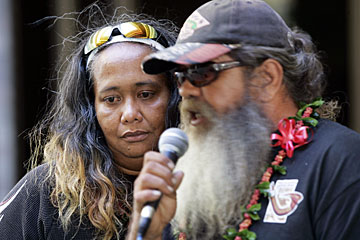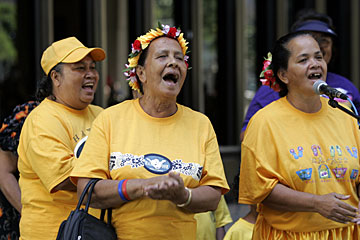
DENNIS ODA / DODA@STARBULLETIN.COM
Homeless people and advocates gathered yesterday at the state Capitol to bring attention to the plight of the homeless at the "Break the Cycle: Shelter for All" rally. Among those attending were Marie Beltran and her husband, John Keawemauhili, who spoke about living at Mokuleia Beach Park.
|
|
Voices of the homeless
Residents and advocates lobby lawmakers for more housing and programs
RISING RENTS pushed Marie Beltran's five children and 12 grandchildren back to the family homestead, a tent at Mokuleia Beach Park.
"It cripples them mentally," said Beltran, who has lived with her husband at the park for more than a decade but whose children, ages 19 to 27, were living in two separate homes until their rents were increased last year. They could not afford the higher rents despite having several jobs each, Beltran said, so "now they're back on the beach."
Beltran and her husband, John Keawemauhili, joined a crowd of more than 150 at the state Capitol courtyard yesterday to push for more affordable-housing developments and programs for Hawaii's growing homeless population.
After a one-hour rally, which included speeches and songs, about 20 people lined up along Beretania Street in front of the Capitol, holding signs that read, "Honk to end homelessness" and "Public policy creates homelessness."
"The problem has gotten worse," the Rev. Bob Nakata, event organizer, said. "And it's gotten worse not only for the poor, but for the working class."
This is the second year for the rally, timed to bring attention to several bills moving through the state Legislature that aim to decrease the homeless population and increase the number of affordable-housing units.

DENNIS ODA / DODA@STARBULLETIN.COM
Rosa Achiske, left, Merko Route and Mercy Onno, from Micronesia, sang during yesterday's rally, timed to bring attention to several bills moving through the state Legislature.
|
|
Nakata said he believes lawmakers have made progress on affordable housing, but added that more needs to be done.
"The homeless and housing is a fundamental problem," added Darlene Hein, director of the Waikiki Health Center's homeless Care-A-Van program. "There really isn't adequate housing for middle-income to very low-income people."
In addition to housing, advocates say, the homeless often need drug abuse or mental health treatment and work-force counseling.
"They suffer from hopelessness," said Amanda Caban, a case manager at the U.S. Vets shelter in Kalaeloa. "They don't have the resources."
Most of the veterans at the shelter are from the Vietnam War era, but two who came in last month served in the Iraq war. Director Darryl Vincent said the shelter, which opened in September 2003, houses 100 veterans.
Some 87 more, he said, live in the program's transitional housing dormitories.
During the rally yesterday, Vivian Miyasato sat on a bench near the state Capitol's pools, watching the action in the courtyard as she held a sign up on her lap that read, "Save the homeless." At the top of her poster, Miyasato had drawn a home with a smiling stick figure man standing nearby.
Miyasato, who is bipolar, said that her psychological disorder has pushed her to homelessness four times. She is now getting help and medication, and she wants to see others get off the streets.
"I now have shelter, food, clothes," she said, her voice choking with tears. "I know it makes a difference."

